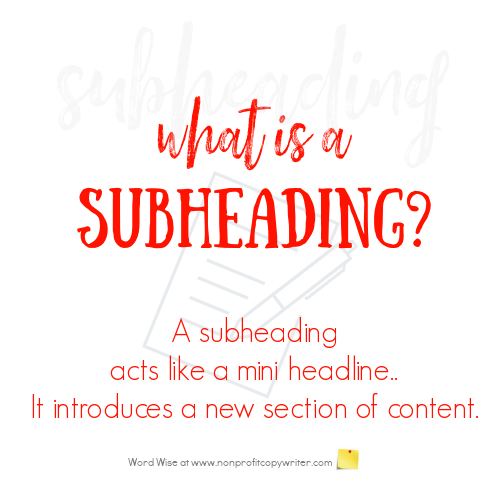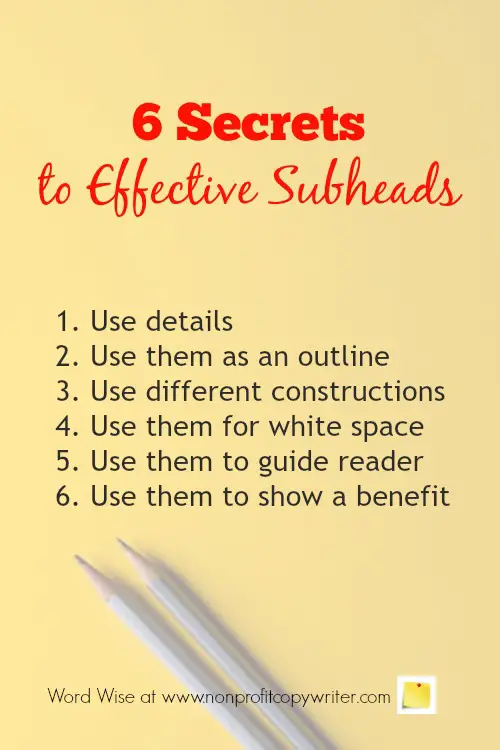Save Time: Get 5 Simple Writing Tips
you can put to use in 10 minutes
6 Secrets to Writing Effective Subheads
Award-winning writer Kathy Widenhouse has helped hundreds of nonprofits and writers produce successful content , with 750K+ views for her writing tutorials. She is the author of 9 books. See more of Kathy’s content here.
Updated 1.13.26
You see subheads in magazine articles, direct mail, newspaper pieces … but maybe you never knew they had a name.
Subheads (short for subheadings) act like miniature headlines. They introduce a new section of your content. You use them in articles, blog posts, web pages, copy – and yes, books.
This is what a subhead looks like
But a word of caution: a few words set off in bold above a paragraph do not an effective sub head make. In fact, when tossed into a manuscript as an afterthought, one of these little headlines can actually weaken the piece.
What's the point in using them? To make it easier for your reader to keep reading your piece. Follow these guidelines to give your subheadings zing and help your reader keep reading until the end.
6 practical tips for writing subheads
1. Use details
Whenever possible, use specifics in subheads. Doing so entices your reader to move through that section of content, rather than skipping it. And when you include relevant keywords into your subheadings, you help readers quickly identify key topics covered in your content – and improve your SEO. Consider the contrast between …
“Vaccuum cleaners”
and …
“78.7 % of all homeowners use one”
Both can appear as subheads over the same section of copy. But the second one narrows the slant of the content to follow (the widespread use of vacuum cleaners).
Plus, you reference “homeowners” which will pull in people who are looking to buy a vacuum cleaner. Doing so keeps this section of your content focused on vacuum cleaners for homeowners without drifting into topics like upright or canister styles.
Writing tip: As with writing headlines, steer clear of generalities. Let your subhead entice the reader with interesting specifics – an unusual fact, idea, or statement.
2. Use subheads to create a content outline
Readers today like to skim – especially on the web. Good subheads summarize the main points in your article, letter, post, or chapter.
I often write the subheads of my content right after I put together the lead. Then, I have a mini-outline to follow as I write the body of the content.
Writing tip: Read through your subheads consecutively, omitting the content in between. They should communicate the gist of your piece. If they don’t, then rewrite them.
3. Use different constructions
- Try active verbs, word pictures, questions and descriptive language as subhead formats. These create interest and lure the reader into the content.
- Use parallelism – create a piece’s subheads using similar structure. Take a look at the subheads in this article. Each one starts with the verb “use.”
- Or you can write parallel subheads as questions.
Writing tip: Avoid using “be” verbs in subheads.
4. Use subheads to create white space
Subheadings break up content. That’s a good thing, because readers are subconsciously overwhelmed when they’re faced with an entire page of unbroken prose. They may just give up. But subheads give the eye relief.
Writing tip: A good rule of thumb for double-spaced manuscripts is 1-2 subheads per page.
5. Use subheads to guide your reader
A subhead announces the next topic and leads the reader through your thought process. They help the brain compartmentalize.
Use subheads to show hierarchy (most important points at top of the article or content) or steps in a process (as in a how-to article.) Organizing your content with subheads helps readers understand the flow and relationship between different sections.
Writing tip: Use the sentence before a subhead as a transition.
6. Use subheads to show a benefit
Use these little titles to show the reader a specific advantage for her – an advantage she wants to read about in the content that follows. For instance,
“Change of direction”
…as a subhead could mean a medical discovery, a late-in-life marriage or a job change – and doesn’t address the pluses of changing direction. But …
“Interactive picture books signal a profitable change of direction”
… suggests that a publishing house has found an ingenious way to capture the preschool market – one that the reader most definitely will want to learn more about.
Writing tip: re-read your subheads to make sure they communicate a particular advantage, plus, fact, outcome or benefit that interests your reader.
Don’t let your subheadings
be an afterthought
Readers skim through your content before deciding to read it in detail. They subconsciously ask themselves, “Is this section – or the next – worth my time?”
Your subheads answer that question with a yes or a no.
That’s why it’s worth your time to invest in each subhead as you do your headline.
More Basic Writing Tips
How to Write Better Bullet Points ...
How To Get Ideas for Writing – and Never Run Out ...
7 essential copywriting elements for powerful nonprofit copywriting ...
50 Copywriting Terms Every Writer Should Know ...
Does your headline do its job?
Using anecdotes: how to capture readers with a slice of life ...
Harness the power of a testimonial ...
An effective response device: top tips to make sure yours works ...
Return from 6 Secrets to Effective Subheads to Nonprofit Copywriter home
As an Amazon Associate I earn from qualifying purchases.
Share This Page

Named to 2022 Writer's Digest list
BEST GENRE/NICHE WRITING WEBSITE


Stop Wasting Time!
Grab your exclusive FREE guide, "5 Simple Writing Tips You Can Put to Use in 10 Minutes or Less"













